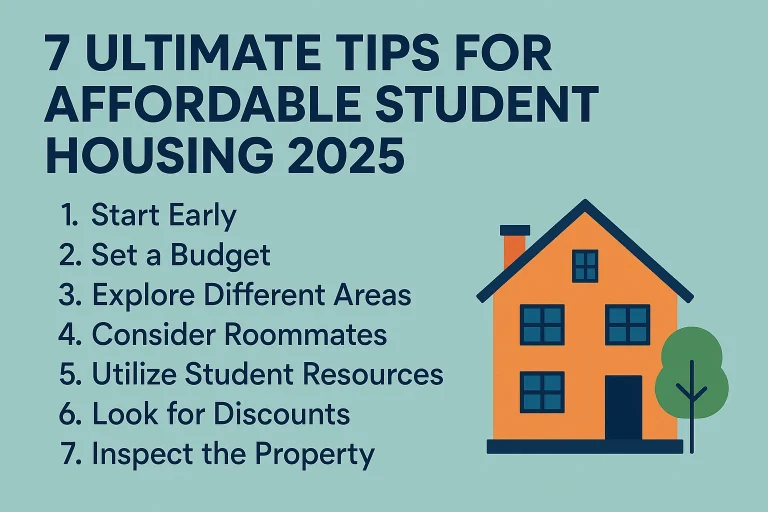One of the biggest challenges international students face when planning to study in the UK is finding affordable student accom. With cities like London, Manchester, and Bristol becoming increasingly expensive, students are often left wondering how they can secure student housing that doesn’t break the bank.
Whether you’re looking for a student apartment, student rooms in shared accommodation, or flexible student housing, the search for affordable housing doesn’t have to be daunting. In this guide, we’ll reveal 7 insider secrets that will help you find the best student housing in popular cities like student accommodation in Birmingham, student accommodation in Bristol, and more.
Let’s dive in and uncover how to save money while securing quality housing for your study abroad UK experience in 2025!
Start Your Accommodation Search Early
One of the most crucial steps in finding affordable student housing in the UK is to start your search early. Waiting until the last minute can result in higher prices, fewer options, and ultimately, a stressful experience.
Why Early Searches Matter:
- Greater Selection: When you start early, you have access to a wider range of properties, which increases your chances of finding something that fits both your budget and needs.
- Better Deals: Many landlords and student accommodation providers offer early bird discounts or special promotions for those who book well in advance.
- Reduced Stress: Early booking provides peace of mind, knowing that your accommodation is secured before you arrive.
Pro Tip:
If you’re planning to study at universities in student accommodation in Oxford or student accommodation in London, starting your search 6 to 12 months ahead will give you a significant advantage in securing more affordable options.
Consider Off-Campus Housing
While student housing in university halls might seem convenient, it’s often one of the more expensive options. Many international students overlook off-campus student housing, which can offer more flexibility and affordability.
Benefits of Off-Campus Housing:
- Lower Rent: Off-campus student housing in areas like Bristol or Manchester tends to be cheaper compared to on-campus accommodation.
- More Options: You can find a variety of housing styles, from shared student housing to student apartments for rent, catering to different budgets and preferences.
- Better Location: Off-campus housing may offer you the opportunity to live in more vibrant, student-centric neighborhoods.
Pro Tip:
Look for accommodation options near student accommodation in Liverpool or student accommodation in Derby, where you can find affordable options that are close to your campus but not in the most expensive areas.
Explore Shared Accommodation
One of the best ways to save money on rent is by opting for shared student housing. Not only does this split the rent and utility costs, but it also provides the chance to live with other students, making your university experience even more social and collaborative.
Benefits of Shared Accommodation:
- Lower Rent: Sharing an apartment or house with others can save you up to 50% on rent.
- All-Inclusive Costs: Many shared accommodations offer all-inclusive rent packages that include utilities, internet, and sometimes even cleaning services.
- Social Opportunities: Living with others means you’re likely to make friends faster, which can help you settle into your new environment.
Pro Tip:
Check for student housing near me options in student accommodation in Glasgow or student accommodation in Birmingham to find affordable shared housing in a convenient location.
Look for Flexible Student Accommodation
If you’re unsure about your long-term plans or need temporary housing, flexible student accommodation options might be the perfect choice for you. These types of accommodations allow you to rent for short-term periods, typically starting from a few weeks to a couple of months.
Advantages of Flexible Accommodation:
- Less Commitment: You can opt for a short-term lease if you’re just visiting for a semester or waiting for a long-term accommodation arrangement.
- Budget-Friendly: Flexible accommodation providers often offer competitive rates for short stays.
- Convenience: Many flexible accommodation providers are located near major universities, such as student accommodation in Manchester or student accommodation in Oxford, offering easy access to your campus.
Pro Tip:
Websites like Student Living and University Living provide listings for flexible student accommodation, especially in major cities like London and Bristol.
Take Advantage of Student Accommodation Discounts
As a student, you’re eligible for various discounts, including on student accommodation. Many accommodation providers offer special deals, including discounts on rent, or lower rates for students who sign leases early or for longer durations.
Types of Discounts Available:
- Early Bird Discounts: Some accommodation providers offer up to 10% off if you book early.
- Referral Discounts: If you recommend the accommodation to other students, you may receive a discount or a gift card.
- Long-Term Lease Discounts: Committing to a 12-month lease instead of a 9-month one may result in a discounted rent rate.
Pro Tip:
When booking student accommodation in Bristol or student accommodation in Glasgow, ask if there are any student discounts or promotions available to reduce your rental costs.
Consider Student Apartments for Greater Independence
For students who want more privacy and independence, student apartments are an excellent option. While they may come at a higher price than shared housing, they provide you with your own space, often with more flexibility regarding the length of the lease.
Benefits of Student Apartments:
- Privacy: Unlike shared accommodation, you’ll have your own space to study, relax, and live.
- More Control: You can customize your living situation to suit your preferences and schedule.
- Convenience: Many student apartments for rent are located close to campuses or easily accessible by public transportation.
Pro Tip:
Check out student accommodation in Liverpool or student accommodation in Derby for student apartments that are affordable yet offer a great deal of privacy and comfort.
Research International Student Housing Platforms
With the rise of online accommodation platforms, finding the best deals on international student housing has never been easier. Websites and apps such as University Living, Uninist, and Student Tenant allow you to filter your search based on budget, location, and accommodation type.
How to Use Housing Platforms Effectively:
- Compare Prices: Look for deals on rent across different providers to find the most affordable options.
- Read Reviews: Check reviews from other international students to ensure you’re booking reliable and comfortable accommodation.
- Explore All Options: Platforms offer access to a wide range of accommodation types, including student flats, shared student housing, and flexible student accommodation.
Pro Tip:
Use platforms like Student.com to search for student accommodation in Oxford and other major cities, ensuring you get the best possible deals and a variety of options to choose from.
Conclusion: Find Your Perfect and Affordable Student Accommodation in the UK
Finding affordable student accommodation in the UK doesn’t have to be a daunting task. By following these 7 insider secrets, including starting your search early, considering off-campus housing, and using online platforms to compare prices, you can secure a great place to live while studying in the UK. Whether you’re looking for student accommodation in Birmingham, student accommodation in Glasgow, or student accommodation in Oxford, there are plenty of budget-friendly options to choose from.
FAQ
-
What are the cheapest cities for student accommodation in the UK?
Cities like Liverpool, Derby, and Leeds tend to offer more affordable housing options compared to cities like London or Oxford.
-
How can I find student accommodation near me in the UK?
You can use platforms like Student Living or University Living to filter housing options based on your location, ensuring you find student accommodation close to your campus.
-
How do student accommodation discounts work?
Accommodation providers often offer discounts for early bookings, longer lease commitments, or referral programs. Be sure to ask about these opportunities when booking your housing.
-
What is the average cost of student accommodation in the UK?
The cost of student accommodation in the UK can vary greatly depending on the city. In London, rents can range from £1,000 to £1,500 per month, while in cities like Bristol or Glasgow, rents typically range from £400 to £900 per month.
-
Can I apply for short-term student accommodation?
Yes, many providers offer short-term student accommodation, which is perfect for exchange students or those staying for a few months. You can find these options on sites like Student.com.
-
What are the benefits of shared student housing?
Shared student housing allows you to split rent and utility costs with roommates, making it one of the most affordable housing options for students.
-
How do I apply for student housing in London?
Use platforms like Student Tenant, University Living, or Uninist to search for student accommodation in London based on your budget and preferences.
-
How much can I expect to pay for student flats in Manchester?
Student flats in Manchester generally cost between £400 and £800 per month, depending on the location and type of accommodation.
-
Is it better to choose university-managed accommodation or private student flats?
University-managed accommodation is often more convenient and social, while private student flats may offer more independence and privacy. Your choice will depend on your personal preferences and budget.
-
Are student apartments more expensive than shared accommodation?
Yes, student apartments are generally more expensive than shared accommodation due to the added privacy and space they offer.








